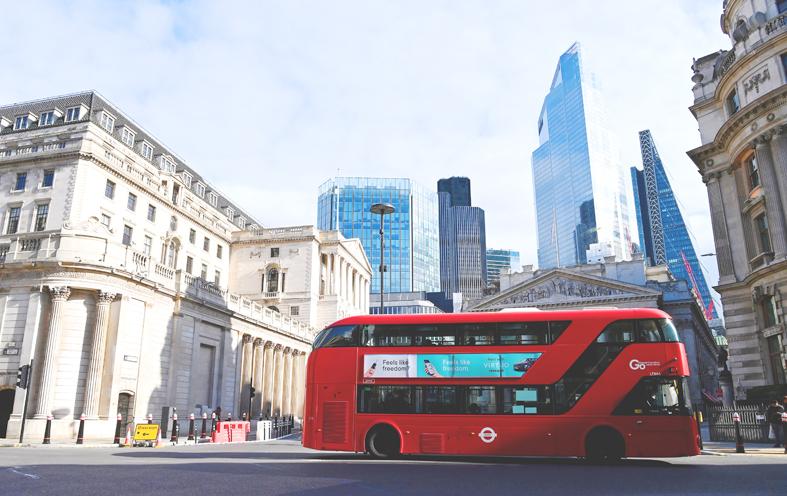The Bank of England has increased its monetary stimulus by a bigger than anticipated £150 billion (US$195 billion) as it tries to boost the economy amid new lockdown measures.
In a statement released yesterday, the central bank’s Monetary Policy Committee said that its challenge is to respond to the economic and financial impact of the resurgence of COVID-19, which has led to the reimposition of widespread restrictions across the UK.
A four-week lockdown began yesterday in England that will keep closed all shops selling items deemed to be non-essential, such as books and clothes, as the government seeks to contain a sharp increase in infections.

Photo: EPA-EFE
The other nations of the UK — Scotland, Wales and Northern Ireland — have also announced wide-ranging restrictions on economic activity.
The latest restrictions will batter an economy that had been just recovering from the sharp recession caused by a spring lockdown.
As a result, the Bank of England was widely expected to respond to the changed economic backdrop.
However, the increase in the bond-buying program is bigger than the £100 billion anticipated in financial markets.
The stimulus is aimed at keeping a lid on borrowing rates across the economy to boost lending as well as ensuring that money keeps flowing through the financial system.
The committee also kept its main interest rate unchanged at the record low of 0.1 percent.
The bank said that Britain’s economy would shrink by 11 percent this year, more severe than the 9.5 percent contraction it forecast in August.
GDP is likely to grow by 7.25 percent next year, weaker than a previous forecast of a 9 percent bounce-back, it said.
Britain’s economy, which as well as COVID-19 is facing the risk of a trade shock when its post-Brexit transition with the EU expires on Dec. 31, has been supported by a surge in debt-fueled spending by the government.
Despite the spending, Britain faces the sharpest peak-to-trough contraction of any G20 economy, Moody’s said on Oct. 16 when it cut Britain’s credit rating.
Additional reporting by Reuters

UNCERTAINTY: Innolux activated a stringent supply chain management mechanism, as it did during the COVID-19 pandemic, to ensure optimal inventory levels for customers Flat-panel display makers AUO Corp (友達) and Innolux Corp (群創) yesterday said that about 12 to 20 percent of their display business is at risk of potential US tariffs and that they would relocate production or shipment destinations to mitigate the levies’ effects. US tariffs would have a direct impact of US$200 million on AUO’s revenue, company chairman Paul Peng (彭雙浪) told reporters on the sidelines of the Touch Taiwan trade show in Taipei yesterday. That would make up about 12 percent of the company’s overall revenue. To cope with the tariff uncertainty, AUO plans to allocate its production to manufacturing facilities in

TAKING STOCK: A Taiwanese cookware firm in Vietnam urged customers to assess inventory or place orders early so shipments can reach the US while tariffs are paused Taiwanese businesses in Vietnam are exploring alternatives after the White House imposed a 46 percent import duty on Vietnamese goods, following US President Donald Trump’s announcement of “reciprocal” tariffs on the US’ trading partners. Lo Shih-liang (羅世良), chairman of Brico Industry Co (裕茂工業), a Taiwanese company that manufactures cast iron cookware and stove components in Vietnam, said that more than 40 percent of his business was tied to the US market, describing the constant US policy shifts as an emotional roller coaster. “I work during the day and stay up all night watching the news. I’ve been following US news until 3am

COLLABORATION: Given Taiwan’s key position in global supply chains, the US firm is discussing strategies with local partners and clients to deal with global uncertainties Advanced Micro Devices Inc (AMD) yesterday said it is meeting with local ecosystem partners, including Taiwan Semiconductor Manufacturing Co (TSMC, 台積電), to discuss strategies, including long-term manufacturing, to navigate uncertainties such as US tariffs, as Taiwan occupies an important position in global supply chains. AMD chief executive officer Lisa Su (蘇姿丰) told reporters that Taiwan is an important part of the chip designer’s ecosystem and she is discussing with partners and customers in Taiwan to forge strong collaborations on different areas during this critical period. AMD has just become the first artificial-intelligence (AI) server chip customer of TSMC to utilize its advanced

Six years ago, LVMH’s billionaire CEO Bernard Arnault and US President Donald Trump cut the blue ribbon on a factory in rural Texas that would make designer handbags for Louis Vuitton, one of the world’s best-known luxury brands. However, since the high-profile opening, the factory has faced a host of problems limiting production, 11 former Louis Vuitton employees said. The site has consistently ranked among the worst-performing for Louis Vuitton globally, “significantly” underperforming other facilities, said three former Louis Vuitton workers and a senior industry source, who cited internal rankings shared with staff. The plant’s problems — which have not